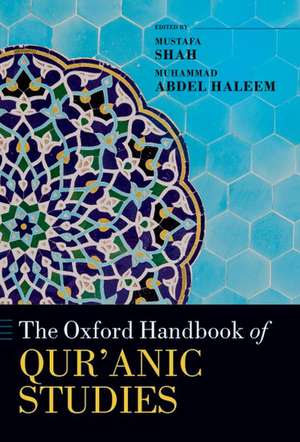The Oxford Handbook of Qur'anic Studies: Oxford Handbooks
Mustafa Shah, Muhammad Abdel Haleemen Limba Engleză Paperback – 7 dec 2023
Din seria Oxford Handbooks
-
 Preț: 236.89 lei
Preț: 236.89 lei - 15%
 Preț: 358.80 lei
Preț: 358.80 lei - 17%
 Preț: 912.51 lei
Preț: 912.51 lei - 12%
 Preț: 307.94 lei
Preț: 307.94 lei - 25%
 Preț: 829.05 lei
Preț: 829.05 lei - 14%
 Preț: 987.01 lei
Preț: 987.01 lei - 26%
 Preț: 1376.97 lei
Preț: 1376.97 lei - 34%
 Preț: 929.22 lei
Preț: 929.22 lei -
 Preț: 303.54 lei
Preț: 303.54 lei - 26%
 Preț: 343.85 lei
Preț: 343.85 lei - 14%
 Preț: 278.15 lei
Preț: 278.15 lei - 29%
 Preț: 930.94 lei
Preț: 930.94 lei - 30%
 Preț: 1065.79 lei
Preț: 1065.79 lei - 15%
 Preț: 357.85 lei
Preț: 357.85 lei -
 Preț: 263.45 lei
Preț: 263.45 lei - 23%
 Preț: 839.81 lei
Preț: 839.81 lei - 16%
 Preț: 264.39 lei
Preț: 264.39 lei - 33%
 Preț: 737.68 lei
Preț: 737.68 lei - 33%
 Preț: 725.45 lei
Preț: 725.45 lei - 26%
 Preț: 342.76 lei
Preț: 342.76 lei - 25%
 Preț: 366.95 lei
Preț: 366.95 lei - 13%
 Preț: 304.72 lei
Preț: 304.72 lei - 16%
 Preț: 263.35 lei
Preț: 263.35 lei - 12%
 Preț: 267.23 lei
Preț: 267.23 lei - 33%
 Preț: 815.51 lei
Preț: 815.51 lei - 6%
 Preț: 346.76 lei
Preț: 346.76 lei - 22%
 Preț: 1095.69 lei
Preț: 1095.69 lei - 29%
 Preț: 931.18 lei
Preț: 931.18 lei - 29%
 Preț: 942.77 lei
Preț: 942.77 lei - 24%
 Preț: 1071.82 lei
Preț: 1071.82 lei - 23%
 Preț: 1052.07 lei
Preț: 1052.07 lei - 21%
 Preț: 863.03 lei
Preț: 863.03 lei - 30%
 Preț: 815.25 lei
Preț: 815.25 lei - 29%
 Preț: 855.42 lei
Preț: 855.42 lei - 30%
 Preț: 842.04 lei
Preț: 842.04 lei - 11%
 Preț: 258.32 lei
Preț: 258.32 lei - 29%
 Preț: 859.51 lei
Preț: 859.51 lei - 29%
 Preț: 1083.61 lei
Preț: 1083.61 lei - 15%
 Preț: 273.41 lei
Preț: 273.41 lei - 30%
 Preț: 818.12 lei
Preț: 818.12 lei - 11%
 Preț: 365.23 lei
Preț: 365.23 lei - 21%
 Preț: 359.87 lei
Preț: 359.87 lei - 13%
 Preț: 264.87 lei
Preț: 264.87 lei - 9%
 Preț: 307.08 lei
Preț: 307.08 lei - 28%
 Preț: 845.79 lei
Preț: 845.79 lei - 23%
 Preț: 855.11 lei
Preț: 855.11 lei - 21%
 Preț: 861.04 lei
Preț: 861.04 lei - 12%
 Preț: 250.34 lei
Preț: 250.34 lei
Preț: 315.06 lei
Preț vechi: 363.53 lei
-13% Nou
Puncte Express: 473
Preț estimativ în valută:
60.29€ • 65.69$ • 50.80£
60.29€ • 65.69$ • 50.80£
Carte disponibilă
Livrare economică 22-28 martie
Preluare comenzi: 021 569.72.76
Specificații
ISBN-13: 9780198896203
ISBN-10: 0198896204
Pagini: 944
Dimensiuni: 170 x 245 x 55 mm
Greutate: 1.81 kg
Editura: OUP OXFORD
Colecția OUP Oxford
Seria Oxford Handbooks
Locul publicării:Oxford, United Kingdom
ISBN-10: 0198896204
Pagini: 944
Dimensiuni: 170 x 245 x 55 mm
Greutate: 1.81 kg
Editura: OUP OXFORD
Colecția OUP Oxford
Seria Oxford Handbooks
Locul publicării:Oxford, United Kingdom
Recenzii
Review from previous edition This Oxford Handbook is a much more evenhanded production. Most topics and points of view get a hearing ... More generous than the Itqān, the Handbook makes space for Sufis, Ibadis, philosophers, and various Shi'i groups.
rich and ambitious
... this book is a must in all mission agencies that work in the Muslim world as well as in all Christian colleges and other agencies that have a heart for Muslims.
This Oxford Handbook of Qur'anic Studies readily brings to mind the earlier multi-volume collection of articles Tafsir (Oxford, Routledge, 2012) edited by the same Mustafa Shah. Common to both works is the Orientalists' sheer wariness of the Qur'ānic text and the Muslim tafsīr tradition. In sum, it is a tendentious work which mainly propagates the agenda of the Revisionist school.
rich and ambitious
... this book is a must in all mission agencies that work in the Muslim world as well as in all Christian colleges and other agencies that have a heart for Muslims.
This Oxford Handbook of Qur'anic Studies readily brings to mind the earlier multi-volume collection of articles Tafsir (Oxford, Routledge, 2012) edited by the same Mustafa Shah. Common to both works is the Orientalists' sheer wariness of the Qur'ānic text and the Muslim tafsīr tradition. In sum, it is a tendentious work which mainly propagates the agenda of the Revisionist school.
Notă biografică
Mustafa Shah studied for his BA in Arabic with Linguistics at SOAS. He later completed his PhD in Islamic Studies with a thesis entitled Religious Orthodoxy and the Development of Arabic Linguistic Thought in 1997. He was appointed a lecturer in Islamic Studies at SOAS in 2002, having previously taught in the Department of Religions and the Near and Middle East Department. He is the editor of Tafsīr: Interpreting the Qur'an (Routledge, 2012) and The Haḍīth: Articulating the Beliefs and Constructs of Classical Islam (Routledge, 2009).Muhammad Abdel Haleem was born in Egypt, and learned the Qur'an by heart from childhood. Educated at al-Azhar, Cairo, and Cambridge Universities, he has taught Arabic and Islamic Studies at Cambridge and London Universities since 1966, including courses in advanced translation and the Qur'an. He is now Professor of Islamic Studies at the School of Oriental and African Studies, University of London. His publications include Understanding the Qur'an: Themes and Style (I. B. Tauris, 2010) and Sharīʿa and the Concept of Benefit: The Use and Function of Maṣlaḥa in Islamic Jurisprudence (I. B. Tauris, 2015).
